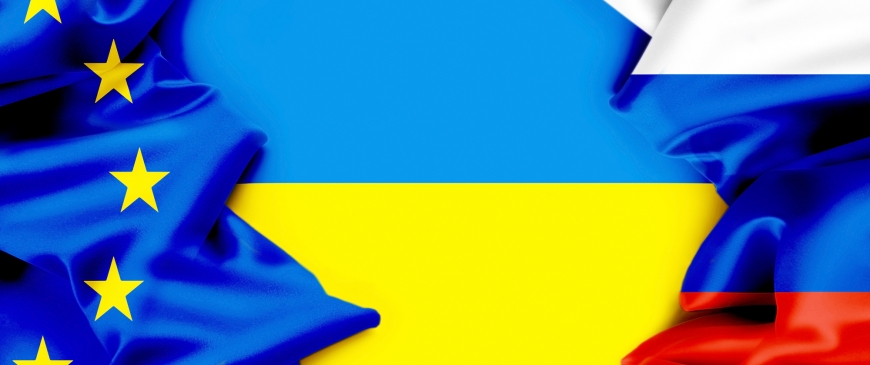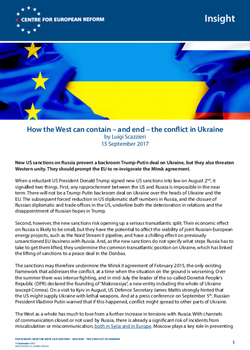
How the West can contain - and end - the conflict in Ukraine
New US sanctions on Russia prevent a backroom Trump-Putin deal on Ukraine, but they also threaten Western unity. They should prompt the EU to re-invigorate the Minsk agreement.
When a reluctant US President Donald Trump signed new US sanctions into law on August 2nd, it signalled two things. First, any rapprochement between the US and Russia is impossible in the near term. There will not be a Trump-Putin backroom deal on Ukraine over the heads of Ukraine and the EU. The subsequent forced reduction in US diplomatic staff numbers in Russia, and the closure of Russian diplomatic and trade offices in the US, underline both the deterioration in relations and the disappointment of Russian hopes in Trump.
Second, however, the new sanctions risk opening up a serious transatlantic split. Their economic effect on Russia is likely to be small, but they have the potential to affect the viability of joint Russian-European energy projects, such as the Nord Stream II pipeline, and have a chilling effect on previously unsanctioned EU business with Russia. And, as the new sanctions do not specify what steps Russia has to take to get them lifted, they undermine the common transatlantic position on Ukraine, which has linked the lifting of sanctions to a peace deal in the Donbas.
Berlin & Paris should test Russia’s apparent willingness to involve the UN in #Ukraine
The sanctions may therefore undermine the Minsk II agreement of February 2015, the only existing framework that addresses the conflict, at a time when the situation on the ground is worsening. Over the summer there was intense fighting, and in mid-July the leader of the so-called Donetsk People’s Republic (DPR) declared the founding of “Malorossiya’’, a new entity including the whole of Ukraine (except Crimea). On a visit to Kyiv in August, US Defence Secretary James Mattis strongly hinted that the US might supply Ukraine with lethal weapons. And at a press conference on September 5th, Russian President Vladimir Putin warned that if this happened, conflict might spread to other parts of Ukraine.
The West as a whole has much to lose from a further increase in tensions with Russia. With channels of communication closed or not used by Russia, there is already a significant risk of incidents from miscalculation or miscommunication, both in Syria and in Europe. Moscow plays a key role in preventing the non-proliferation of nuclear weapons, especially in relation to Iran but potentially also in North Korea. It can undermine Western foreign policy across the board, from the Western Balkans and Turkey to Libya and Iran. Russia also remains the largest single supplier of EU energy imports, with a 38 per cent share of natural gas and 29 per cent of oil in 2016.
The EU should not be tempted to abandon Minsk II, but rather revive it, pushing for a stable ceasefire and renewed dialogue on the terms of a peace deal. As long as the conflict in Ukraine endures, so does the potential for escalation.
The Minsk II agreement has not been implemented so far. The complete lack of trust between Ukraine and the Russia-backed groups in the east, and the constant jockeying for advantage and presence of heavy weapons on the frontlines means no ceasefire has ever taken hold. There are also major disagreements over the agreement’s thirteen points. For example, the text stipulates that Ukraine will only regain control of its border with Russia after local elections and the implementation of constitutional reform (Point 9). Yet it does not specify a timeframe for these steps and for the withdrawal of ‘foreign armed formations’ [Russian troops] (Point 10). Russia and Ukraine also disagree over the substance of constitutional reform. Russia wants the Donbas to have more powers devolved to it than Kyiv is prepared to concede.
There has been no progress, despite French and German attempts to lay out a clear timeline. In many respects, the status quo is acceptable to both Moscow and Kyiv. The simmering conflict allows Russia to achieve its overarching aim of hindering Ukraine’s integration with the West. The costs of intervention have been limited: the drop in the oil price and sanctions hurt Russia, with GDP shrinking by 2.8 per cent in 2015 and 0.2 per cent in 2016. But the economy returned to growth in late 2016 and early 2017. Putin can live with sanctions, in the hope that eventually Ukrainians’ desire for integration with the West may diminish or that the West will reduce its support, frustrated by Kyiv’s foot-dragging on reform, and its persistent corruption problem.
For Kyiv, the costs of the conflict are high. Yet so is the political cost of moving ahead with unpopular constitutional reform and of making compromises with the de facto authorities in the Donbas, who are viewed by most Ukrainians as responsible for thousands of military and civilian deaths. Paradoxically, the status quo is politically tolerable because the conflict provides the government with an alibi for inadequate progress with reforms.
Following Putin’s call for UN involvement in the Donbas on September 5th, France and Germany should revive the Minsk agreement by pushing for a UN peacekeeping force, backed by a Security Council resolution. Kyiv has asked for UN peacekeepers in the past, and recent polling suggests that a majority of the Ukrainian public is in favour. While Russia and Ukraine have different visions of what UN involvement would mean – Russia only envisages UN personnel protecting OSCE monitors – there may be space for convergence. Berlin and Paris should build on this embryonic convergence and test Russia’s willingness to involve the UN by pushing for a peacekeeping mission. UN troops would initially take up positions along the line of contact and separate the two sides, but should be able to monitor the whole of the Donbas. China or India would be ideal candidates to provide troops. Both countries are seen as neutral by Russia and Ukraine, and make large contributions to peacekeeping missions. Both could be interested in such a role, if it boosted their international prestige.
The changing international context makes it likelier that Moscow may support such an initiative. Russia hoped that the European consensus on sanctions would fray. But the EU continues to renew sanctions on Russia every six months. Pro-Russian populist parties failed to achieve an electoral breakthrough in the Austrian, Dutch and French elections. And, despite the UK’s vote to leave, the EU seems more united and confident, with its economy picking up momentum. Moscow might have hoped earlier in the year that a new SPD-led German government would be more open to relaxing sanctions. But it now seems certain that Chancellor Angela Merkel’s CDU will be the largest party and that the SPD will either have to return to a grand coalition as the junior partner, or go into opposition. Sanctions policy is unlikely to change.
Russia may be tempted to force its proxies in #Ukraine to finally implement the ceasefire
Following the German election, therefore, Russia may be tempted to force its proxies in the Donbas to implement the ceasefire and withdrawal of heavy weapons, thus shifting the burden of fulfilling the political aspects of the agreement to Kyiv, which is struggling to pass constitutional reform. Moscow could then hope that Germany and other important EU member-states would agree to relax EU sanctions, at least in part.
If a ceasefire takes hold in the Donbas, the conflict would be frozen. Minsk II would remain the overarching political framework, and EU sanctions would remain in place, linked to the return of the Donbas to Ukraine. This would be an outcome Ukraine, Russia, the EU and the US could all live with, however reluctantly. There are plenty of other frozen conflicts in the former Soviet Union – Abkhazia and South Ossetia in Georgia; Transnistria in Moldova; and Nagorno Karabakh in Azerbaijan; most of the time they remain reasonably stable. But accepting a new frozen conflict would be sub-optimal for all parties. The risk of renewed fighting would persist, albeit lessened. It would be difficult for Ukraine to focus on reform. And without comprehensive sanctions relief, some sectors of Russia’s economy would still suffer in the long run – though the oil price would remain the main determinant of GDP growth.
If the conflict does become frozen, the EU and US should step up their efforts to strengthen Ukraine, increasing financial and administrative support to make it more difficult and less attractive for Moscow to destabilise it. They should aim for a peace deal based on the return of the Donbas to Ukraine as a region with limited local autonomy. Ukraine would probably accept such a deal, especially if the EU offers to contribute to the reconstruction of the war-torn Donbas.
The challenge for the West will be persuading Russia to fully return the Donbas, as this would reduce Moscow’s leverage on Kyiv. Even in the unlikely case sanctions were increased enough to hurt Russia’s economy, Moscow is very unlikely to budge until the West can change its perception that Ukraine is part of a geopolitical zero sum game, and that Kyiv can either be aligned with the West, or under Russia’s thumb.
Specifically, Russia is unlikely to ever give up the Donbas as long as it is thinks Ukraine might then stand a better chance of joining NATO than it does currently. This fear would be eased if neutrality were written into Ukraine’s constitution. But, while Ukrainian de facto neutrality is inevitable in the short term given that the West will not admit Ukraine to NATO, de jure neutrality is impossible in the current Ukrainian political environment. It will only become possible if Ukraine comes to believe that the cost of seeking NATO membership is too high, and that formal neutrality is the best way to regain the Donbas and guarantee its future security.
The West should increase support for #Ukraine & show Russia it can benefit from Ukraine’s EU integration
As it increases its support for Ukraine, the West should try to show Russia that it too can benefit from Ukraine’s economic integration with the West. The EU should work with the Russian-led Eurasian Economic Union (EAEU) to reduce tariff and non-tariff barriers to trade, giving Ukraine, which is not a member of the EAEU, the chance to benefit from its free trade agreement with the EU and to rebuild economic links with Russia and other EAEU members. Given good economic relations between Ukraine and China, there may be scope to lower trade barriers between Russia and Ukraine in the broader context of linking together the EU, the EAEU and China’s One Belt One Road initiative, as suggested in Ian Bond’s recent CER policy brief.
Attempting to resolve the conflict and normalise relations between Moscow and Kyiv is a long-term endeavour. A deal would not ‘reset’ ties between the West and Russia: many sanctions, including all sanctions specific to Crimea and the recently imposed US sanctions, will remain in place until the status of Crimea is legally settled. But peace in the Donbas would reduce the dangers of West-Russia confrontation and give Ukraine greater chance to prosper.
Luigi Scazzieri is a reseach fellow at the Centre for European Reform.


Add new comment